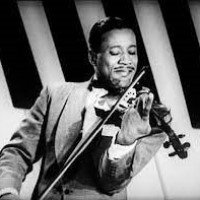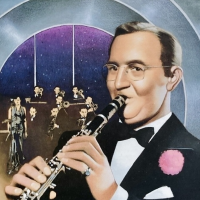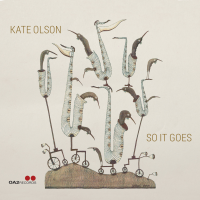Home » Jazz Musicians » Ray Nance
Ray Nance
Ray Nance was a multi-talented individual. He was a fine trumpeter who not only replaced Cootie Williams with Duke Ellington's Orchestra, but gave the "plunger" position in Duke's band his own personality. In addition, Nance was one of the finest jazz violinists of the 1940s, an excellent jazz singer, and even a dancer. He studied piano, took lessons on violin, and was self-taught on trumpet. After leading a small group in Chicago (1932-1937), spending periods with the orchestras of Earl Hines (1937-1938) and Horace Henderson (1939-1940), and a few months as a solo act, Nance joined Duke Ellington's orchestra. His very first night on the job was fully documented as the band's legendary Fargo concert. A very valuable sideman, Nance played a famous trumpet solo on the original version of "Take the 'A' Train" and proved to be a fine wa-wa player; his violin added color to the suite "Black, Brown and Beige" (in addition to being showcased on numerous songs), and his singing on numbers such as "A Slip of a Lip Will Sink a Ship" and "Tulip or Turnip" was an added feature. Nance is also one of the well-known vocalists from the Ellington orchestra, having sung not the first version (that credit goes to Ivie Anderson), but arguably the definitive version of "It Don't Mean a Thing (If It Ain't Got That Swing)." It was his contribution to take the previously instrumental horn riff into the lead vocal, which constitute the now infamous, "Doo wha, doo wha, doo wha, doo wha, yeah!" He was often featured as vocalist on "Jump for Joy," "Just A-Sittin' and A-Rockin'" and "Just Squeeze Me (But Please Don't Tease Me)". Nance was with Ellington with few interruptions until 1963; by then the returning Cootie Williams had taken some of his glory. Nance made a few recordings as a bandleader, and also recorded or performed with Earl Hines, Rosemary Clooney and others. The remainder of Nance's career was relatively insignificant, with occasional small-group dates, gigs with Brooks Kerr and Chris Barber (touring England in 1974), and a few surprisingly advanced sideman recordings with Jaki Byard and Chico Hamilton.
Tags
The Duke Ellington Carnegie Hall Concerts: January 1943

by Chuck Lenatti
Duke Ellington was one of the most popular and successful jazz musicians of the first half of the 20th century and according to composer Gunther Schuller and musicologist and historian Barry Kernfeld, “the most significant composer of the genre." Radio broadcasts from his residency at New York's Cotton Club beginning in 1927 extended Ellington's orchestra's national exposure and a parade of hit records, from “East St. Louis Toodle-Oo" in 1926 to “C Jam Blues" in 1942, among many ...
Continue ReadingDuke Ellington: Copenhagen 1958

by Ken Dryden
Duke Ellington left a formidable discography at his death at the age of 75 in 1974, and it has expanded greatly with the number of concerts that have been uncovered and issued since then. This CD is drawn from two 1958 concerts at KB Hallen in Copenhagen, though they are not sourced from the original, long lost broadcast tapes, but dubs evidently made by a fan. What makes this a valuable find is that the band is in top form ...
Continue ReadingDuke Ellington: Copenhagen 1958

by Jack Kenny
Duke Ellington hated flying so, in 1958, Ellington and Co sailed into Southampton UK to prepare for a tour of Europe. Before going on to Copenhagen, Ellington completed a tour of the UK, taking in Leeds where he met Queen Elizabeth, an event which eventually resulted in the “Queen's Suite." Earlier in the year, his strange obsession with royalty had produced a piece for Princess Margaret, “Princess Blue'" The band was particularly strong in this part of its ...
Continue ReadingRay Nance: Body and Soul

by Jeff Dayton-Johnson
Ray Nance recorded Body and Soul, his first album as a leader, in May 1969, almost thirty years after he took over Cootie Williams' trumpet chair in the Duke Ellington orchestra, but only about two years after Billy Strayhorn's death in May 1967, and mere days after Coleman Hawkins' in May 1969. Nance performed “Take the 'A' Train" at Strayhorn's funeral, and “Body and Soul" at Hawk's. Both threnodies are included here as duets with pianist Roland Hanna. Nowhere is ...
Continue ReadingRay Nance, Roy Ayers, Don Ellis, Pepper Adams, Harold Land, Eddie Condon, Edmond Hall Reissues on Mighty Quinn

Source:
All About Jazz
Mighty Quinn Productions was developed out of my respect for music and the people who make it. Our goal is to reissue recordings by quality artists that have not yet been released on CD, or have sadly fallen out of print. We want to make sure that worthy albums in all genres of music aren't lost or forgotten. We also plan to produce compelling new artists who we believe should be heard. Mighty Quinn is committed to providing the best ...
read more

































